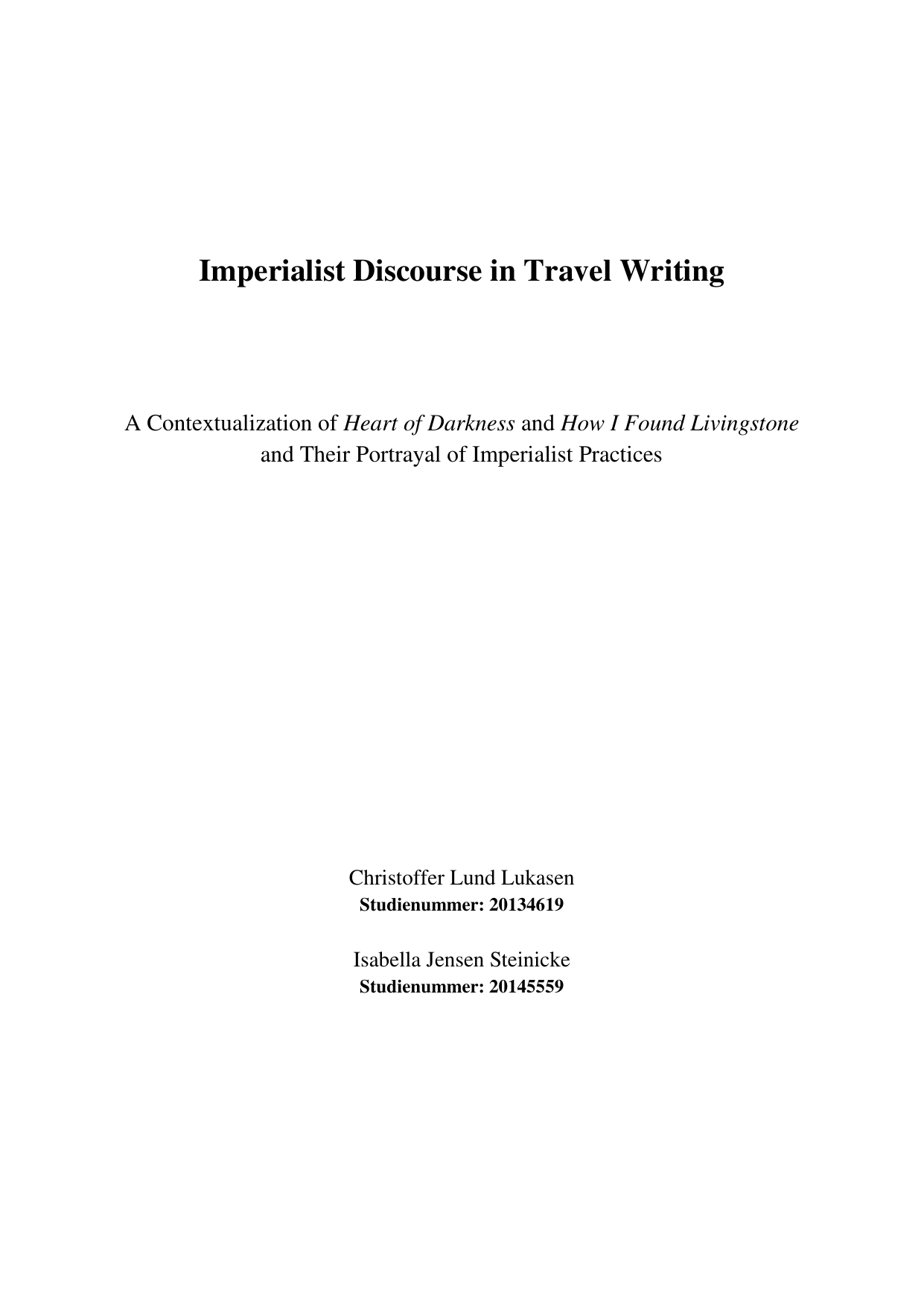
Imperialist Discourse in Travel Writing: A Contextualization of Heart of Darkness and How I Found Livingstone and Their Portrayal of Imperialist Practices
Term
4. term
Education
Publication year
2019
Submitted on
2019-06-02
Pages
103
Abstract
Abstract The following paper includes an analysis of Joseph Conrad’s Heart of Darkness and Henry Morton Stanley’s How I Found Livingstone using theories regarding narratology, and postcolonialism, along with the approaches of Foucault and New Historicism. The focus of the analysis will be on the two texts’ representations of imperialism, and the aforementioned theories and approaches will be applied to examine whether or not the narratives of the two texts adhere to the imperialist discourse and its altruistic legitimization of colonial undertakings, their historical context, as well as the power associated with the knowledge each author circulates. The postcolonial theories are based on the works of Edward Said and the terminology of Albert Memmi, and their function is to inform on the roles associated with colonial undertakings and their results on both colonizer and colonized. As for narratology, our terminology is based on the work of Mieke Bal. The analysis is carried out with a focus on narratology as a means of analyzing the different aspects of the two narratives, as well as how these portray the discourses and counter-discourses at play within the narratives. The postcolonial aspects are presented through the terms of colonizer and colonized, each covering one of the groups involved in colonial undertakings, as well as the nature of the relationship between these two groups. Through our analysis we determine that Stanley’s plot, and his use of narratological tools, adheres to the mindset of the colonizer and reinforces the imperialist discourse, whereas Conrad’s produces a counter-discourse disputing the actions taken in the name of imperialism through a subversion of the traditional quest plot structure. As such, each author approaches the topic of imperialism differently, although comments in Conrad’s text indicate that he does not oppose imperialism as a concept, only the discrepancy between the concept and the practice.
Abstract The following paper includes an analysis of Joseph Conrad’s Heart of Darkness and Henry Morton Stanley’s How I Found Livingstone using theories regarding narratology, and postcolonialism, along with the approaches of Foucault and New Historicism. The focus of the analysis will be on the two texts’ representations of imperialism, and the aforementioned theories and approaches will be applied to examine whether or not the narratives of the two texts adhere to the imperialist discourse and its altruistic legitimization of colonial undertakings, their historical context, as well as the power associated with the knowledge each author circulates. The postcolonial theories are based on the works of Edward Said and the terminology of Albert Memmi, and their function is to inform on the roles associated with colonial undertakings and their results on both colonizer and colonized. As for narratology, our terminology is based on the work of Mieke Bal. The analysis is carried out with a focus on narratology as a means of analyzing the different aspects of the two narratives, as well as how these portray the discourses and counter-discourses at play within the narratives. The postcolonial aspects are presented through the terms of colonizer and colonized, each covering one of the groups involved in colonial undertakings, as well as the nature of the relationship between these two groups. Through our analysis we determine that Stanley’s plot, and his use of narratological tools, adheres to the mindset of the colonizer and reinforces the imperialist discourse, whereas Conrad’s produces a counter-discourse disputing the actions taken in the name of imperialism through a subversion of the traditional quest plot structure. As such, each author approaches the topic of imperialism differently, although comments in Conrad’s text indicate that he does not oppose imperialism as a concept, only the discrepancy between the concept and the practice.
Keywords
Documents
